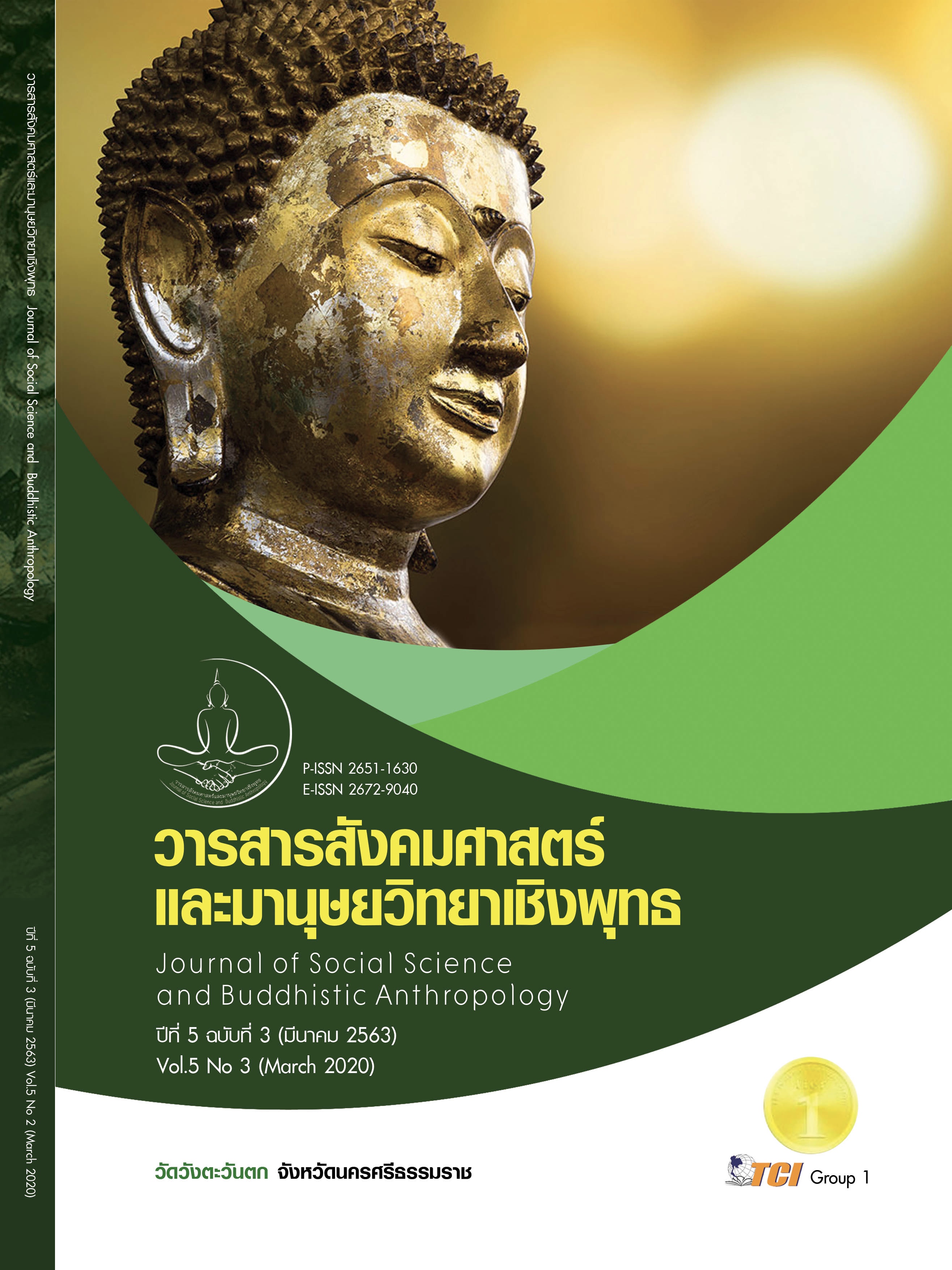A MODEL OF HUMAN CAPITAL’S MORAL DEVELOPMENT BASED ON BUDDHIST PSYCHOLOGY OF THAI-GERMAN INSTITUTE’S VOCATIONAL TRAINING PROJECT FOR DISABILITIES AND POVERTY
Keywords:
Human Capital, Morality, Buddhist Psychology, Vocational Training Project, Thai - German InstituteAbstract
The objective of this research were 1) to study vocational education and Office of the Non-Formal and Informal Education (NFE)’s policy 2) to analyse ethical and vocational based instructional system in Thai-German Institute’s Vocational Training Project for Disabilities and Poverty (VTPDP) 3) to analyse the lessons learnt and to initiate Human capital’s moral development model based on Buddhist Psychology of Thai-German Institute’s Vocational Training Project for Disability and Poverty. Qualitative research was implemented. Qualitative target groups are Vocational Training Project’s stakeholders totally 37 persons as well as connoisseurship experts 7 persons selected by purposive sampling. Content analysis and analytic induction were applied as data analysis method. Results were as follows, 1) the concept and principle of vocational education and NFE’s policy mainly aim on Education Ministry’s core policy 2) The instructional system for VTPDP of Thai-German Institute, was classified into 2 sections: basic courses and the major with general technical courses and training including extracurricular activities 3) the result of Human Capital Model’s moral development based on Buddhist psychology of VTPDP showed 1) the instructional process of vocational and ethical curriculum, composing of Behavior development process based on the threefold principles, Thai-German soft skills learning management as well as Technician’s hard skills learning management and evaluation based on Benjamin Bloom’s theory and 2) after 1 year training program, the VTPDP trainees have obviously transformed their behavior and competencies. This research found the model of human capital’s moral development or called “GEO Model”, which consists of 3 steps. Beginning with 1) the goodness and virtue of VTPDP’s stakeholders 2) the process of encouraging goodness and virtue through organizational culture and human capital development. 3) the output shown as the opportunities for society response including trainees’ growth mindset. After the procedure of “Geo Model”, the outcome of VTPDP was derived as Thai - German Institute’s growth mindset.
References
กรมสวัสดิการและคุ้มครองแรงงาน. (2562). ความหมายของแรงงานกึ่งฝีมือ. เรียกใช้เมื่อ 24 กุมภาพันธ์ 2562 จาก https://www.labour.go.th/th/index.php?option=com _glossary&letter =S&id =372 &Itemid=109
กองพัฒนาเทคโนโลยีการฝึกและพัฒนาฝีมือแรงงาน. (2554). รูปแบบการฝึก On the Job Training และ Off the Job Training : (OJT). เรียกใช้เมื่อ 24 กุมภาพันธ์ 2562 จาก https://home.dsd.go.th/techno/trainingsystem/
ธัญญลักษณ์ วีระสมบัติ. (2561). การสังเคราะห์งานวิจัยเกี่ยวกับปริมาณและคุณภาพแรงงานไทยในอุตสาหกรรมการผลิตไทย. วารสารสังคมสงเคราะห์ศาสตร์, 26(2), 1-40.
ประสพชัย พสุนนท์. (2558). ความเที่ยงตรงของแบบสอบถาม สำหรับงานวิจัยทางสังคมศาสตร์. วารสารสังคมศาสตร์ มหาวิทยาลัยศรีนครินทรวิโรฒ, 18(1), 375-396.
พระธรรมปิฎก (ป.อ.ปยุตฺโต). (2546). การสังเคราะห์งานวิจัยแนวทางการเรียนรู้ตามหลักไตรสิกขา. ใน รายงานการวิจัย. มหาจุฬาลงกรณราชวิทยาลัย.
วันชัย สุขตาม. (2555). การพัฒนาทุนมนุษย์วิถีพุทธในยุคโลกาภิวัตน์. ใน ดุษฎีนิพนธ์รัฐประศาสนศาสตร สาขารัฐประศาสนศาสตร์. มหาวิทยาลัยราชภัฎวไลยอลงกรณ์.
สถาบันพัฒนาธุรกิจอย่างยั่งยืน. (2556). ความรับผิดชอบต่อสังคมเพื่อความยั่งยืนขององค์กร. (พิมพ์ครั้งที่ 1). กรุงเทพมหานคร: สถาบันธุรกิจเพื่อสังคม.
สำนักงานคณะกรรมการสภาพัฒนาการเศรษฐกิจและสังคมแห่งชาติ. (2559). แผนพัฒนาเศรษฐกิจและสังคมแห่งชาติฉบับที่ 12. เรียกใช้เมื่อ 2 พฤษภาคม 2560 จาก https://www.nesdb.go.th/ ewt_ news.php?nid=6420
สุริยจรัส เตชะตันมีนสกุล. (2552). การวิเคราะห์องค์ประกอบของระบบคุณค่าและบรรทัดฐานในสังคมไทย. ใน รายงานการวิจัย. มหาวิทยาลัยลำปาง.









